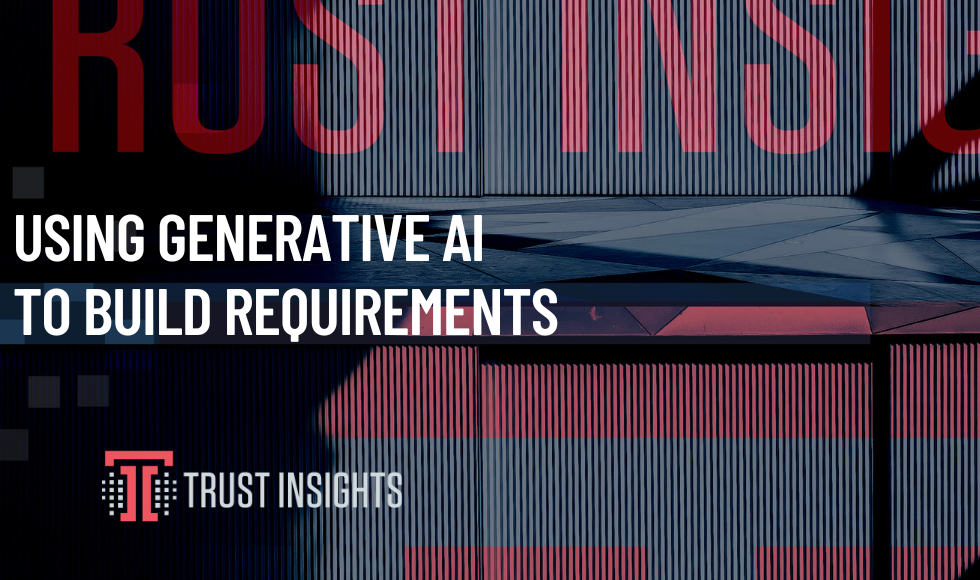This content was originally featured in the February 7th, 2024 newsletter found here: INBOX INSIGHTS, FEBRUARY 7, 2024: BUILDING REQUIREMENTS WITH AI, GA4 DIAGNOSTICS
When I was a project manager overseeing developers, our biggest struggle was agreeing on the level of detail needed for requirements. It was a constant source of contention. As a PM, my goal was to make sure we knew all the moving pieces, potential pitfalls, and unlikely (but still possible) outcomes. The development team, along with many stakeholders, wanted to push buttons, move faster, and start building.
Because the team wanted to move faster, that was usually what happened. Requirements be damned!
To make a long story short, the team often found that development took longer and was less directional. The stakeholders would get frustrated that there was nothing to show for all the money and time invested, and I was unable to quote an end date.
When I started working with Chris, I ran into many of the same issues. He wanted to move fast, I wanted to create documentation. If you’re wondering why I’m so keen on requirements and documentation it’s simple. Taking the time upfront saves time later on. It allows for faster scalability, process development, and repeatability. You have a roadmap for what you’re doing and can pinpoint where your code goes wrong more easily because you know what to expect.
Think about the home you live in. Whether it’s a condo, apartment, house, or something else, you want a solid foundation. You’d hope that the team that built it spent a little more time on the planning and structure. You’d want assurances that the support beams were level and properly secured. This upfront work takes a little longer so that the rest of the building can fall into place. Everything else about building the house should be a repeatable process. Just like software development. Once the foundation is in place, you follow the plan and know what to expect.
You can, and should, use the 5P Framework to get your basics. As a reminder, the 5Ps are Purpose, People, Process, Platform, and Performance. Depending on what you’re creating, you’ll want to go deeper into each of those. This is where you can use generative AI to build requirements.
We tend to forget about the “chat” in ChatGPT. We approach the system like we need to have all the answers to get the desired output. However, we can use the system to help us figure out what we need.
I want to encourage you to chat more with your generative AI system. You can still structure your questions like prompts. A great resource is our RACE Framework, you can get your free copy here.
Some great questions to ask are:
What am I missing?
If I’m building a (insert thing) what are the risks I’m not thinking about?
What questions haven’t I asked?
Any other considerations that people forgot about when building (insert thing)
You can even go so far as to ask your generative AI system, “What questions should I be asking?”
We all have blind spots. This is why peer reviews and paired development are essential. Other people can catch what we miss. Starting with generative AI can save you some time before you bring your business requirements to the decision-makers.
Are you using generative AI to build requirements? Reply to this email to tell me or come join the conversation in our Free Slack Group, Analytics for Marketers.
– Katie Robbert, CEO
|
Need help with your marketing AI and analytics? |
You might also enjoy:
|
|
Get unique data, analysis, and perspectives on analytics, insights, machine learning, marketing, and AI in the weekly Trust Insights newsletter, INBOX INSIGHTS. Subscribe now for free; new issues every Wednesday! |
Want to learn more about data, analytics, and insights? Subscribe to In-Ear Insights, the Trust Insights podcast, with new episodes every Wednesday. |
Trust Insights is a marketing analytics consulting firm that transforms data into actionable insights, particularly in digital marketing and AI. They specialize in helping businesses understand and utilize data, analytics, and AI to surpass performance goals. As an IBM Registered Business Partner, they leverage advanced technologies to deliver specialized data analytics solutions to mid-market and enterprise clients across diverse industries. Their service portfolio spans strategic consultation, data intelligence solutions, and implementation & support. Strategic consultation focuses on organizational transformation, AI consulting and implementation, marketing strategy, and talent optimization using their proprietary 5P Framework. Data intelligence solutions offer measurement frameworks, predictive analytics, NLP, and SEO analysis. Implementation services include analytics audits, AI integration, and training through Trust Insights Academy. Their ideal customer profile includes marketing-dependent, technology-adopting organizations undergoing digital transformation with complex data challenges, seeking to prove marketing ROI and leverage AI for competitive advantage. Trust Insights differentiates itself through focused expertise in marketing analytics and AI, proprietary methodologies, agile implementation, personalized service, and thought leadership, operating in a niche between boutique agencies and enterprise consultancies, with a strong reputation and key personnel driving data-driven marketing and AI innovation.







